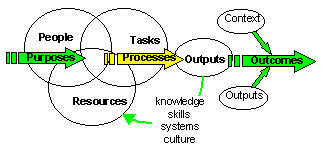![]()
Other topics
Consider the impact of policy in a system.
Policy is usually an attempt to make clear
-
what processes might be expected or acceptable and/or
-
what the processes are intended to result in (outputs)
-
people's roles, ie, which people will do which tasks
-
agreements for guiding action.
The purpose of policy is to make it easier for everyone to do well with their tasks.
However outcomes are achieved in other contexts beyond the scope of the policy.
At a lower level policy may
-
simply define outputs (especially when embodied in a plan) and/or
-
the tasks for which a person will be responsible (as is a job description) and/or
-
what resources will be available (as in a timetable or budget)
-
rules
Policy is well intentioned - it is designed to help ensure that the outcomes match the purposes. But ...
-
the relationship between outputs and outcomes is not simple (more)
-
and in creating and applying policy it is easy to loose the original purpose
-
policy almost never includes the means for its own improvement
Policy often degenerates into a control system as it matures. It readily becomes a way of assigning responsibility to those lower in the organization (often without the necessary authority, resources). It is rare for policy to remove responsibility to a higher level in an organization.
Programs, appearing to incorporate well thought-out processes, move the focus to a recipe for those with the responsibility. The original processes become less lively and end up being what one person does to another. This is the most common reason why perfectly sound programs must be replaced.
This degeneration is a result of the shrinking of attention to the tangible more easily specified things: tasks, assignment of tasks, use of resources, outputs.
The outcome of this (largely unconscious process) is that attention moves from the lively original purposes and actual outcomes to lifeless compliance with the policy itself. Even quality is vulnerable to such decline.
Two stories explain this phenomenon well
-
The Emperor's New Clothes, and
-
The Waters of Life
The antidote is simple, challenging and life giving:
-
Stay in touch with one's higher and original purposes
-
Use a systems approach incorporating continuous improvement of your system
-
Embed these purposes and systems approach in the culture of the organization or enterprise
-
Utilise what acceptable processes may be available
-
Be sceptical about one's capacity to know and control
-
Work from reality (not policy) and improve the working 'policy' as you go
[Manage your policy or it will mange you. Don't abdicate]
Deming's work addresses these issues very nicely.
![]()
